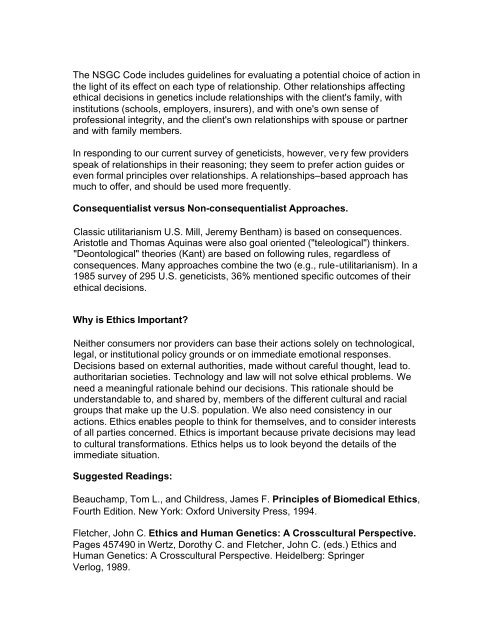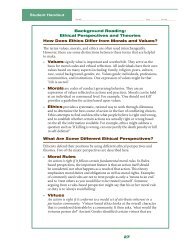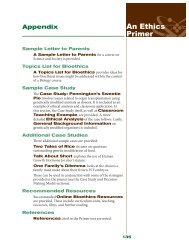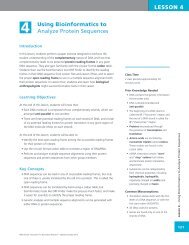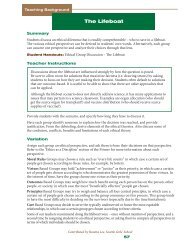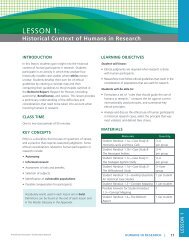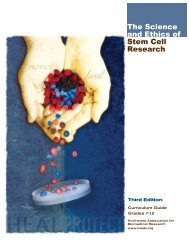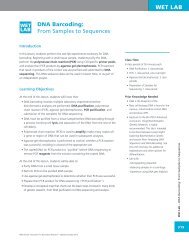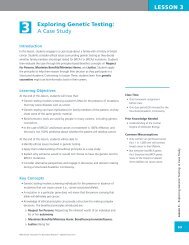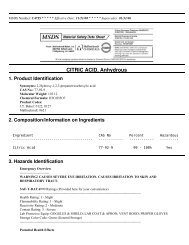Ethics: A Primer for Non-Ethicists (PDF) - ASPB News
Ethics: A Primer for Non-Ethicists (PDF) - ASPB News
Ethics: A Primer for Non-Ethicists (PDF) - ASPB News
Create successful ePaper yourself
Turn your PDF publications into a flip-book with our unique Google optimized e-Paper software.
The NSGC Code includes guidelines <strong>for</strong> evaluating a potential choice of action in<br />
the light of its effect on each type of relationship. Other relationships affecting<br />
ethical decisions in genetics include relationships with the client's family, with<br />
institutions (schools, employers, insurers), and with one's own sense of<br />
professional integrity, and the client's own relationships with spouse or partner<br />
and with family members.<br />
In responding to our current survey of geneticists, however, very few providers<br />
speak of relationships in their reasoning; they seem to prefer action guides or<br />
even <strong>for</strong>mal principles over relationships. A relationships–based approach has<br />
much to offer, and should be used more frequently.<br />
Consequentialist versus <strong>Non</strong>-consequentialist Approaches.<br />
Classic utilitarianism U.S. Mill, Jeremy Bentham) is based on consequences.<br />
Aristotle and Thomas Aquinas were also goal oriented ("teleological") thinkers.<br />
"Deontological" theories (Kant) are based on following rules, regardless of<br />
consequences. Many approaches combine the two (e.g., rule-utilitarianism). In a<br />
1985 survey of 295 U.S. geneticists, 36% mentioned specific outcomes of their<br />
ethical decisions.<br />
Why is <strong>Ethics</strong> Important<br />
Neither consumers nor providers can base their actions solely on technological,<br />
legal, or institutional policy grounds or on immediate emotional responses.<br />
Decisions based on external authorities, made without careful thought, lead to.<br />
authoritarian societies. Technology and law will not solve ethical problems. We<br />
need a meaningful rationale behind our decisions. This rationale should be<br />
understandable to, and shared by, members of the different cultural and racial<br />
groups that make up the U.S. population. We also need consistency in our<br />
actions. <strong>Ethics</strong> enables people to think <strong>for</strong> themselves, and to consider interests<br />
of all parties concerned. <strong>Ethics</strong> is important because private decisions may lead<br />
to cultural trans<strong>for</strong>mations. <strong>Ethics</strong> helps us to look beyond the details of the<br />
immediate situation.<br />
Suggested Readings:<br />
Beauchamp, Tom L., and Childress, James F. Principles of Biomedical <strong>Ethics</strong>,<br />
Fourth Edition. New York: Ox<strong>for</strong>d University Press, 1994.<br />
Fletcher, John C. <strong>Ethics</strong> and Human Genetics: A Crosscultural Perspective.<br />
Pages 457490 in Wertz, Dorothy C. and Fletcher, John C. (eds.) <strong>Ethics</strong> and<br />
Human Genetics: A Crosscultural Perspective. Heidelberg: Springer<br />
Verlog, 1989.


